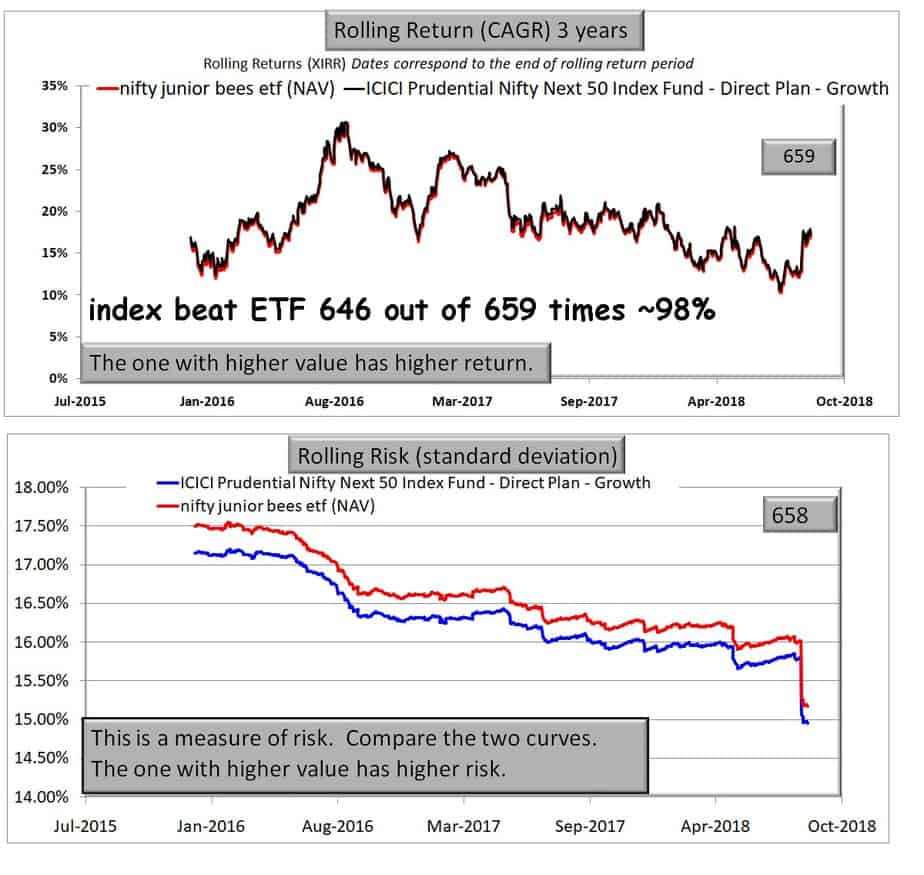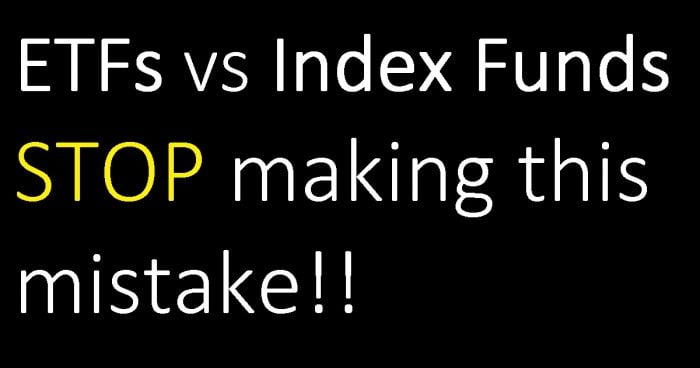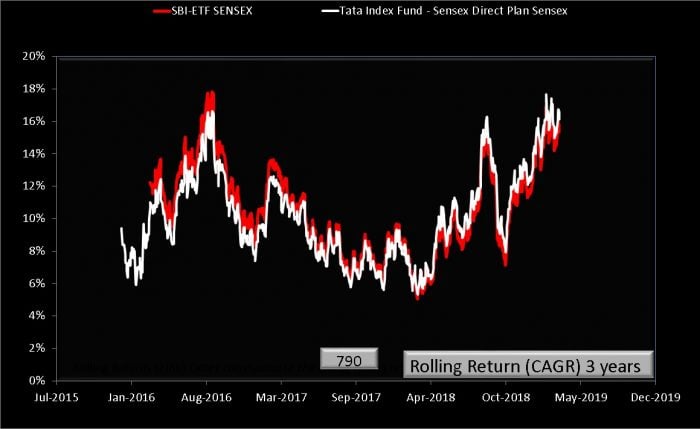Last Updated on December 29, 2021 at 11:51 am
So many people make the mistake of assuming that just because an ETF has a lower expense ratio than an index fund, it will result in higher returns (excluding demat account fee and brokerage), There is no evidence to this. The return from an index fund or an ETF depends on several factors. In this post, we will see how an index fund with a significantly higher return than an ETF can result in comparable or even a bit more return.
In the case of an index fund, how closely it tracks the index is measured by the tracking error. Although this is not an intuitive number, too many people use it forgetting that sometimes index funds can outperform their indices for the wrong reasons! So it is important to always use returns to track performance.
In this case of an ETF, the return that one gets is decided by the price of the unit and not the NAV of the unit. If you are new to ETFs and how they work, please start with this post: How ETFs are different from Mutual Funds: A Beginner’s Guide and then Interested in ETFs? Here is how you can select ETFs by checking how easy it is to buy/sell them,
Join 32,000+ readers and get free money management solutions delivered to your inbox! Subscribe to get posts via email! (Link takes you to our email sign-up form)

🔥Want to create a complete financial plan? Learn goal-based investing? Exclusive access to our DIY tools? Increase your income with your skills? Use this link to enjoy massive discounts on our robo-advisory tool & courses! 🔥
Only when the difference between the ETF price and ETF NAV is not too much, see for example how to check this here: What is the best way to invest in Nifty Next 50 Index – can one use the NAV as a proxy for the price. Unfortunately, all portals use ETF NAV for computing tracking error and returns. The ETF tracking error is not representative of how much investor returns differ from index returns. For this article, I use some graphs previously used to compare a NIfty Next 50 ETF and an index fund.
ICICI Prudential Nifty Next 50 Index Fund-Direct Plan vs Reliance ETF Junior BeES
Earlier I was under the impression that the NAV reported does not include ETF dividends (they declare these and it can either be put back into the fund or distributed). However, thankfully, this is not the case, The dividends (if any) seem to treated as reinvested for NAV computation.
Three years: Index fund NAV vs ETF NAV
First, let us compare the 3 year rolling return and rolling risk of ETF and index fund. We shall use the ETF NAV.

Three years: Index fund NAV vs ETF Price
When we use the ETF price instead of the NAV (the right thing to do), the outperformance is not as high.

The risk (shown in the bottom panel) is also higher for the ETF price due to market forces. However, notice that even though the ETF has significantly lower expense ratio than the index fund (about 0.5% at the time of writing), this does not result in return or risk outperformance.
The trend is the same for four and five years. Check out the video below or this post: What is the best way to invest in Nifty Next 50 Index?
SBI Sensex ETF vs Tata Index fund 3 year rolling returns
 SBI Nifty Index fund Vs ICICI Nifty ETF rolling returns
SBI Nifty Index fund Vs ICICI Nifty ETF rolling returns
For both of the above cases, notice that sometimes the ETF does better (NAV was here) and sometimes the index fund. So outperformance does not depend on expense alone. So please stop assuming lower expenses will result in higher returns!
Video Version
Summary: What should be done?
I would suggest the following:
- Stay away from ETFs where the price to nav difference is frequently high. See List of Index Mutual Funds and ETFs in India: What to choose and what to avoid
- Always compare returns of the index fund with the index fund and the same with the ETF. Do not use a tracking error.
- Do not forget to factor in brokerage and demat fee when you are comparing index funds with ETFs.
- There is only one situation where lower expense will result in higher returns. That is with direct funds as the portfolio is identical to that of the regular fund: Which are the most popular direct plan mutual funds?
Latest from freefincal on YouTube

Use our Robo-advisory Tool to create a complete financial plan! ⇐More than 3,000 investors and advisors use this! Use the discount code: robo25 for a 20% discount. Plan your retirement (early, normal, before, and after), as well as non-recurring financial goals (such as child education) and recurring financial goals (like holidays and appliance purchases). The tool would help anyone aged 18 to 80 plan for their retirement, as well as six other non-recurring financial goals and four recurring financial goals, with a detailed cash flow summary.
🔥You can also avail massive discounts on our courses and the freefincal investor circle! 🔥& join our community of 8000+ users!
Track your mutual funds and stock investments with this Google Sheet!
We also publish monthly equity mutual funds, debt and hybrid mutual funds, index funds, and ETF screeners, as well as momentum and low-volatility stock screeners.
You can follow our articles on Google News

We have over 1,000 videos on YouTube!

Join our WhatsApp Channel



- Do you have a comment about the above article? Reach out to us on Twitter: @freefincal or @pattufreefincal
- Have a question? Subscribe to our newsletter using the form below.
- Hit 'reply' to any email from us! We do not offer personalised investment advice. We can write a detailed article without mentioning your name if you have a generic question.
Join 32,000+ readers and get free money management solutions delivered to your inbox! Subscribe to get posts via email! (Link takes you to our email sign-up form)
About The Author
 Dr M. Pattabiraman (PhD) is the founder, managing editor and primary author of freefincal. He is an associate professor at the Indian Institute of Technology, Madras. He has over 13 years of experience publishing news analysis, research and financial product development. Connect with him via Twitter(X), LinkedIn, or YouTube. Pattabiraman has co-authored three print books: (1) You can be rich too with goal-based investing (CNBC TV18) for DIY investors. (2) Gamechanger for young earners. (3) Chinchu Gets a Superpower! for kids. He has also written seven other free e-books on various money management topics. He is a patron and co-founder of “Fee-only India,” an organisation promoting unbiased, commission-free, AUM-independent investment advice.
Dr M. Pattabiraman (PhD) is the founder, managing editor and primary author of freefincal. He is an associate professor at the Indian Institute of Technology, Madras. He has over 13 years of experience publishing news analysis, research and financial product development. Connect with him via Twitter(X), LinkedIn, or YouTube. Pattabiraman has co-authored three print books: (1) You can be rich too with goal-based investing (CNBC TV18) for DIY investors. (2) Gamechanger for young earners. (3) Chinchu Gets a Superpower! for kids. He has also written seven other free e-books on various money management topics. He is a patron and co-founder of “Fee-only India,” an organisation promoting unbiased, commission-free, AUM-independent investment advice.Our flagship course! Learn to manage your portfolio like a pro to achieve your goals regardless of market conditions! ⇐ More than 3,500 investors and advisors are part of our exclusive community! Get clarity on how to plan for your goals and achieve the necessary corpus no matter the market condition!! Watch the first lecture for free! One-time payment! No recurring fees! Life-long access to videos! Reduce fear, uncertainty and doubt while investing! Learn how to plan for your goals before and after retirement with confidence.
Increase your income by getting people to pay for your skills! ⇐ More than 800 salaried employees, entrepreneurs and financial advisors are part of our exclusive community! Learn how to get people to pay for your skills! Whether you are a professional or small business owner seeking more clients through online visibility, or a salaried individual looking for a side income or passive income, we will show you how to achieve this by showcasing your skills and building a community that trusts and pays you. (watch 1st lecture for free). One-time payment! No recurring fees! Life-long access to videos!
Our book for kids: “Chinchu Gets a Superpower!” is now available!


Must-read book even for adults! This is something that every parent should teach their kids right from their young age. The importance of money management and decision making based on their wants and needs. Very nicely written in simple terms. - Arun.Buy the book: Chinchu gets a superpower for your child!
How to profit from content writing: Our new ebook is for those interested in getting a side income via content writing. It is available at a 50% discount for Rs. 500 only!
Do you want to check if the market is overvalued or undervalued? Use our market valuation tool (it will work with any index!), or get the Tactical Buy/Sell timing tool!
We publish monthly mutual fund screeners and momentum, low-volatility stock screeners.
About freefincal & its content policy. Freefincal is a News Media organisation dedicated to providing original analysis, reports, reviews and insights on mutual funds, stocks, investing, retirement and personal finance developments. We do so without conflict of interest and bias. Follow us on Google News. Freefincal serves more than three million readers a year (5 million page views) with articles based only on factual information and detailed analysis by its authors. All statements made will be verified with credible and knowledgeable sources before publication. Freefincal does not publish paid articles, promotions, PR, satire or opinions without data. All opinions will be inferences backed by verifiable, reproducible evidence/data. Contact Information: To get in touch, please use our contact form. (Sponsored posts or paid collaborations will not be entertained.)
Connect with us on social media
- Twitter @freefincal
- Subscribe to our YouTube Videos
- Posts feed via Feedburner.
Our publications
You Can Be Rich Too with Goal-Based Investing
 Published by CNBC TV18, this book is designed to help you ask the right questions and find the correct answers. Additionally, it comes with nine online calculators, allowing you to create custom solutions tailored to your lifestyle. Get it now.
Published by CNBC TV18, this book is designed to help you ask the right questions and find the correct answers. Additionally, it comes with nine online calculators, allowing you to create custom solutions tailored to your lifestyle. Get it now.Gamechanger: Forget Startups, Join Corporate & Still Live the Rich Life You Want
 This book is designed for young earners to get their basics right from the start! It will also help you travel to exotic places at a low cost! Get it or gift it to a young earner.
This book is designed for young earners to get their basics right from the start! It will also help you travel to exotic places at a low cost! Get it or gift it to a young earner.Your Ultimate Guide to Travel
 This is an in-depth exploration of vacation planning, including finding affordable flights, budget accommodations, and practical travel tips. It also examines the benefits of travelling slowly, both financially and psychologically, with links to relevant web pages and guidance at every step. Get the PDF for Rs 300 (instant download)
This is an in-depth exploration of vacation planning, including finding affordable flights, budget accommodations, and practical travel tips. It also examines the benefits of travelling slowly, both financially and psychologically, with links to relevant web pages and guidance at every step. Get the PDF for Rs 300 (instant download)

